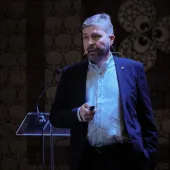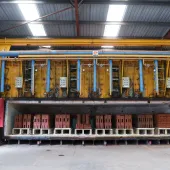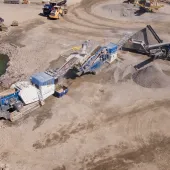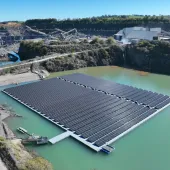Testing quarry tailings for use as hydro-energy fluid
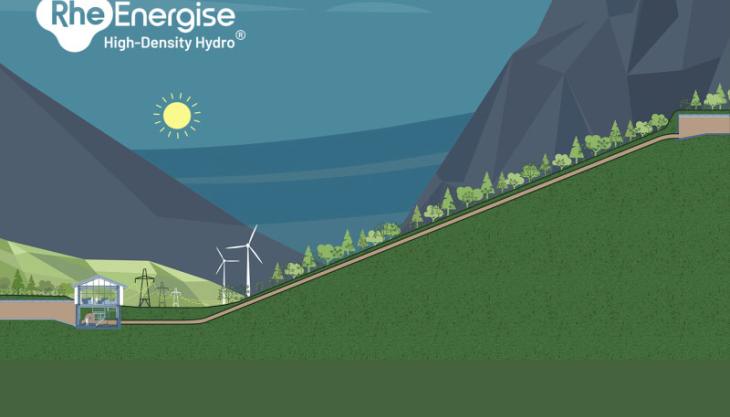
RheEnergise and partners secure £1 million grant to examine use of tailings in hydro-energy storage system
IN partnership with the University of Greenwich and the University of Exeter, RheEnergise, the UK company that is developing a new and advanced form of pumped hydro-energy storage, has secured a grant of £1 million, funded through the Net Zero Innovation Portfolio (NZIP) as part of the UK Government’s Energy Entrepreneurs Fund (EEF).
The government grant will fund work to identify and test waste materials, such as tailings from mines and quarries, that could be used in the high-density fluid (HDF) that is integral to RheEnergise’s grid-scale High-Density Hydro energy-storage system. The HDF is an environmentally benign alternative to water.
RheEnergise say their long-duration storage system is low-cost and energy efficient. The fluid used in the system is 2.5 times denser than water (similar in viscosity to cream) and is therefore able to provide 2.5 times the power and 2.5 times the energy when compared with conventional low-density hydro-power systems that rely on water, such as those operating in the Scottish Highlands, Wales and across Europe.
This means that RheEnergise can deploy their long-duration energy storage system beneath the surface of hills rather than mountains, thereby opening up huge commercial opportunities in the UK, Europe and further afield. According to RheEnergise, there is very real potential for their storage system to be deployed in operating mines and quarries.
The research project, funded by the UK Department for Energy Security and Net Zero, wants to identify suitable minerals and waste streams that can be recycled into the high-density fluid and which can be locally sourced and are lower cost, rather than having to rely on minerals imported from overseas.
Stephen Crosher, chief executive of RheEnergise, said: ‘The opportunities presented by the EEF grant are phenomenal. We are delighted to be able to lead and partner with two outstanding universities – Greenwich and Exeter. The project has the potential to solve three huge questions that affect people daily and globally: those of climate change mitigation; delivering firm power supply from renewables; and how to use waste from other industries for new purposes, creating truly circular economies.
‘The government grant, from the Department for Energy Security and Net Zero, will help us to cut the operating cost of our hydro-energy storage system, whilst increasing its sustainability. By using locally sourced waste materials, we can lower the costs of our projects, reduce carbon emissions from transportation and processing, and create a new circular economy where none currently exists.
‘Working with colleagues from Greenwich and Exeter universities, our research team will be closely examining waste and tailings from various sources but in particular from mines and quarries. There is also the potential that operating mines and quarries, which by their very nature have high elevations and are high energy users, could use our energy storage system.’
Commenting on the EEF grants, Graham Stuart MP, UK Energy Minister, said: ‘This funding will see the next generation of energy pioneers drive forward cheap and sustainable low-carbon technologies. This will not only deliver green jobs and lower the costs of energy to businesses, but also foster world-leading solutions to net zero and economic growth.’
Later this year, RheEnergise will start work on building a 250kW/1MWh (4 hours) demonstrator of their High-Density Hydro energy storage system at a site near Plymouth and are planning to have their first 5MW grid-scale project in commercial operation within the next three to five years.
How the High-Density (HD) Hydro system works
At times of low energy demand, with associated low costs, the high-density fluid R-19 is pumped uphill between storage tanks (buried underground). The storage tanks are connected by underground pipes. As energy prices rise, the non-corrosive fluid is released downhill and passes through turbines, generating electricity to supply power to the grid.
Projects will range from 5MW to 100MW of power and can work with vertical elevations as little as 100m or less. This means that, unlike conventional pumped hydro-energy storage, a RheEnergise HD Hydro system can operate beneath small hills rather than mountains; the system requires 2.5 times less vertical elevation. It also means that there are many more sites suitable for RheEnergise projects in the UK and across the world.
RheEnergise’s analysis of potential project opportunities has indicated that there are around 6,500 site opportunities in the UK alone, c.115,000 in Europe, c.345,000 in North America and c.500,000 in Africa and the Middle East.
In November 2022, RheEnergise were awarded an £8.25 million small business research initiative (SBRI) contract from the UK Government’s Net Zero Innovation Portfolio (NZIP) to deploy a first-of-a-kind demonstrator at a site near Plymouth, Devon.





